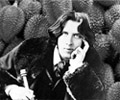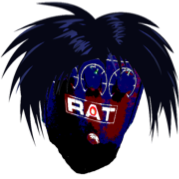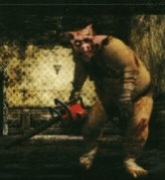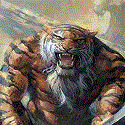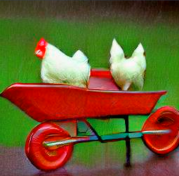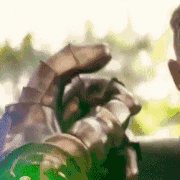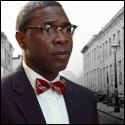|
The Making of Atomic Bomb has many delightful little episodes, and I wonder which of them have made it into Nolan's script. The epilogue of the book ends with an appeal to the world to find a supranational answer to the problem of international conflict and the nuclear annihilation it promises, hoping that the the problem of artificial mass destruction can be depoliticized and rationalized as the struggle against disease was. That argument sure reads differently today... then again, it also had a dark irony to it then with the failures of the AIDS response.
|
|
|
|

|
| # ? Jun 1, 2024 05:21 |
|
Good-Natured Filth posted:Is it easy to know if an author is using a pen name? I'm worried now that I've been misattributing authorship if it's a common occurrence. Seems like twitter is pretty well broken these days, but I know a lot of authors would mention aliases/pseudonyms in their bios. But sometimes you'll find them in their author blurbs, or the "Books also by..." section in the actual books. Some also choose to keep their alias personas very separate/secret for various reasons (like Stephen King secretly being Richard Bachman [including a fake author photo and bio] and no one admitting it until a bookstore clerk figured it out and published an interview with King about it). So I wouldn't worry too much about it if an alias isn't super obvious.
|
|
|
DurianGray posted:Seems like twitter is pretty well broken these days, but I know a lot of authors would mention aliases/pseudonyms in their bios. But sometimes you'll find them in their author blurbs, or the "Books also by..." section in the actual books.
|
|
|
|
|
oh hey speaking of early stephen king: just finished my first book of his, Carrie. the only thing i knew about it was the basic, basic plot: girl in high school experiences her first period, she develops telekinesis. i did not know about the other details that made me loving profoundly relate to her-- her mom, the rural area, the religious themes through it all. the idea that she never had a chance, that she was kind of immediately broken by sheer circumstance-- the wrong place, the wrong mom, and so on. book hosed me up big time, it was excellent
|
|
|
|
Lampsacus posted:poo poo for a second there I thought you said Richard Bach, the writer of Jonathan Livingston Seagull etc. Stephen King moonlighting as a new age boomer terrible hippie hack because he secretly loves that stuff haha. I do like Richard Bach's writing in an odd way, but think he's a hack too who epoused a lot of ideas which made the boomers terrible.
|
|
|
|
Yeah, King is deservedly considered one of the best writers out there despite having a lot of misses/mediocre stuff as well, but I feel that's kind of unavoidable given his output. Can't always bring your A game when you write that much. Still, even his worst stuff I'd consider to be pretty drat good and his best works are absolutely top tier. Do you have kids and want to get hosed up? Read Pet Semetary. That book haunted me for days/weeks after. Join us in the King thread if you want more recommendations and stuff.
|
|
|
|
Megazver posted:This happens a lot to print authors. The first book comes out and doesn't sell out, so the automated system that orders all the book orders slightly fewer copies of the second one, which doesn't sell out, so the system orders fewer copies of the third one, etc, until the author is unsellable. Or, in Stephen King's case, he had too many books he wanted to publish in a short period of time and wrote under the name "Richard Bachman," using a photo of his literary agent's insurance representative as the author's portrait: quote:At the beginning of King's career, the general view among publishers was that an author was limited to one book per year, since publishing more would be unacceptable to the public. King therefore wanted to write under another name in order to increase his publication without saturating the market for the King "brand". He convinced his publisher, Signet Books, to print these novels under a pseudonym.
|
|
|
|
Oh I thought the story was that he wanted to see how much of his success was just brand and How much was quality. Turns out some of his best work didnít move many copies without his name. Apocryphal I guess
|
|
|
|
|
Rose Madder is an incredibly  book by Stephen King. Some of those stories really go to some dark places. book by Stephen King. Some of those stories really go to some dark places.
|
|
|
|
Eccentric Orbits - The Iridium Story by John Bloom is the story of the comsats that power Iridium satellite phones. It's obviously exhaustively researched, but man, it's a slog to get through, particularly in the second half. I would have liked to spend more time with the inventors and engineers of the spacecraft constellation, and not so much with all the filthy-rich financiers trying to buy it after the original business plan failed. There are only so many times you can read a variation of "now THIS group of investors is trying to save the satellites before they get deorbited, but oh no, Motorola did something dickish and ruined it" before you get bored. Maybe it would be of more interest to fans of international business dealing, but speaking as a space nerd, I found myself skimming more and more just to get to the end already.
|
|
|
|
tuyop posted:Oh I thought the story was that he wanted to see how much of his success was just brand and How much was quality. Turns out some of his best work didn’t move many copies without his name. Apocryphal I guess It's not apocryphal, King straight up says it in the introduction to The Bachman Books. Bachman was developing something of a following by the time the news broke, and King reckoned that Misery would have been a breakout book for his alter ego. But as he put it: Thinner sold 8,000 copies when Bachman was the author and 400,000 when King was the author.
|
|
|
|
Lampsacus posted:poo poo for a second there I thought you said Richard Bach, the writer of Jonathan Livingston Seagull etc. Stephen King moonlighting as a new age boomer terrible hippie hack because he secretly loves that stuff haha. I do like Richard Bach's writing in an odd way, but think he's a hack too who epoused a lot of ideas which made the boomers terrible. I read a lot of Bach in my youth, and it feels to me that he was a poor hippie with a slightly saccharine but inspirational message who gradually became a rich hippie who was completely out of touch. As I remember describing to a friend "You should be happy, you're completely free to do what you want. I mean, I'm rich and I'm happy and can do what I want, so you should too." Feel the same could be said of Paul Coelho
|
|
|
|
Just finished How to Change Your Mind: What the New Science of Psychedelics Teaches Us About Consciousness, Dying, Addiction, Depression, and Transcendence by Michael Pollan. It was a NY Times bestseller, he did a heavy promotional tour supporting it, so I will only touch on the highlights. This non fiction book starts with covering the history of psychedelic discovery and use in the West (and a bit on traditional uses of ayahuasca, peyote, and the introduction of psilocybin to the west), focusing on how promising these chemicals appeared to be for psychology, which was a new history I didn't know of. Then, he covers how all that got hosed up (spoiler alert: its Timothy Leary's fault) and these substances were banned from further research. Subsequently, he covers the hard work to rehabilitate these medicines, and how powerfully they can help deal with existential dread related to death, anxiety, depression, and addiction. A fair bit of the neurological effects are covered. At its root, LSD, psilocybin, DMT (not all substances work like this) at least appear to shut off the ego center of the mind, the so called "Default Mode Network" that is absent during childhood but slowly takes over into adulthood. This he states is adaptive, helping to parse away "irrelevancies" that might distract one from survival behavior. By turning this off, it effectively kicks habitual thinking "out of its deep ruts" and allows for the making of new associations, and reset mental priorities. By shutting off the ego and its constant vigilance over sensory input, one can see how one is connected to a greater web of connectivity, something Zen Buddhist Master Thich Nhat Han called "interbeing". Some volunteers in modern studies state that taking these substances allowed them to see their connectivity to everything, and in light of that, smoking or drinking just seemed stupid, unimportant, and they just stopped. FMRI studies of brains on psychedelics showed this shutting off of the DMN, and similar brain activity in children and experienced meditators as well. The book isn't just a dry recap of scientific studies however, but is a personal journey of the author as well, who interviews all of the players in this field, and describes his own exploration of the effects of mushrooms, acid, and ayahuasca ceremonies. Its written simply, and engagingly, and despite its length it pulls you along, wanting to see how the narrative progresses. Highly recommended!
|
|
|
|
|
It's an unusually personal nonfiction book for me to be interested in reading - the failures of anti-depressants to improve my mental state and the physical dependency I've formed make me enthusiastic about psychedelics as an alternative.
|
|
|
nonathlon posted:I read a lot of Bach in my youth, and it feels to me that he was a poor hippie with a slightly saccharine but inspirational message who gradually became a rich hippie who was completely out of touch. As I remember describing to a friend "You should be happy, you're completely free to do what you want. I mean, I'm rich and I'm happy and can do what I want, so you should too."
|
|
|
|
|
I just finished the last book, The Speaking Bones, in the Dandelion Dynasty quadrilogy by Ken Liu. Iíd say this is one of the most skillful and respectful conclusions to a seriously epic story that Iíve read. All the loose threads felt planned and came together tightly. Nothing was saccharine or cynical, just like balanced and human. I canít recommend each of these books enough. The second, The Wall of Storms, was probably my favourite because thatís when the ďsilkpunkĒ engineering really takes off, but each book is a cohesive exploration of a different question in political philosophy and ethics. Iíve written enough about them over the last few months and I hope everyone reads them!
|
|
|
|
|
Well guess I'll be reading Dandelion Dynasty next, my neighbor loves the series and I've heard nothing but excellent things about it. I have all four sitting on my book shelf waiting for me and am making my way through Octavia Butler's Kindred right now. Thanks for the extra push to start them.
|
|
|
|
Some Desperate Glory, by Emily Tesh, picked up when I saw it in the library a day or two after Cythereal mentioned it here. Exactly as she described it, dystopic space opera about a young woman who starts thoroughly indoctrinated by her horrible fascist little society that's one of the last "independent" remnants of humanity after Earth's destruction at alien hands. The first... half-ish feels kind of facile about such things, fixated a bit on a "humans are this setting's orcs" metaphor at first, but then events really kick off and everything also gets a lot more blunt yet pointed. The action writing is okay, but often gets really spare and vague, but that's not really the main appeal. I'm also not crazy about some of the storytelling decisions, but for reasons other than how Tesh comes down very firmly about these pricks. it's still pretty good and while my crappy attention span made getting through the first half kind of slow, the second half held me pretty firmly until I finished today.
|
|
|
|
House of leaves. I love and hate this book. But it is an experience.
|
|
|
|
Just finished the horror novelette Nothing But Blackened Teeth by Cassandra Khaw. On the one hand I really liked it and felt engaged, but on the other I struggled to follow the action at times. With all of the not so deeply buried conflicts and hurts among the characters, I also struggle with why the gently caress they were even all together like that. I also lack a lot of knowledge of Japanese folklore, mythology, and demonology, which is left assumed. Fair, normally Western folklore is left assumed too.
|
|
|
|
|
TehRedWheelbarrow posted:House of leaves. This is pretty much the quintessential review of that book - "I love it, I hate it, I experienced it." I've read it maybe five times - about every four years or so - because I keep convincing myself I enjoyed it the previous time and then I get like two-thirds of the way through and I remember how I did not, in fact, enjoy it. And then I just want to throw it into a fire and move on. But every time I convince myself I need to finish it. Which reminds me that it's almost time to dig out my copy again...
|
|
|
|
House of Leaves is a great novel. It is, however, a bad book. I will not be taking questions.
|
|
|
|
i liked it a lot and didn't have much trouble with it. guess i'm built different. i did read the full color remastered version which has the footnotes at the bottom of the applicable pages, though, and i think other editions of it don't, and you have to flip to the end? which would make me hate it.
|
|
|
|
landgrabber posted:i liked it a lot and didn't have much trouble with it. guess i'm built different. Endnotes are literally literally the dumbest idea anyone has ever had vis-à-vis books. They should find the person who invented them and punch them in the face.
|
|
|
|
3D Megadoodoo posted:Endnotes are literally literally the dumbest idea anyone has ever had vis-à-vis books. They should find the person who invented them and punch them in the face. sounds like youre gonna put an end note on their life
|
|
|
|
Flipping Pages back and forth, it's like a tennis match. Sorry you can't appreciate brilliance.
|
|
|
|
Gaius Marius posted:Flipping Pages back and forth, it's like a tennis match. Sorry you can't appreciate brilliance. I have RSI you bastard.
|
|
|
|
This only really works with perfect bound paperbacks, but if flipping to endnotes is a chore for whatever reason, take a utility knife and cut them off through the spine so you have 2 books. One of the professors at my grad school told all their students they might want to do it with their Infinite Jest copies and they all said it made it way easier to read. (Obviously only do this with a copy you own and don't care that much if it gets messed up. But it's just a mass market paperback, and if it's something like House of Leaves it's not hard to find a cheap used copy you can slice and dice.)
|
|
|
|
DurianGray posted:This only really works with perfect bound paperbacks, but if flipping to endnotes is a chore for whatever reason, take a utility knife and cut them off through the spine so you have 2 books. One of the professors at my grad school told all their students they might want to do it with their Infinite Jest copies and they all said it made it way easier to read. What were they professor of - the incel department?  e: Regardless, though. If the choice is a method which doesn't mean you need to saw your book in half or flip pages at all, and a method where you have to judo kick your book into smithereens and/or hella flip pages, IDK I just feel like one is not as good as the other, at all.
|
|
|
|
I just finished the first omnibus of the first 3 books of The Black Company, a recommendation I've had floating around in my head for years after hearing about it in TBB. I accidentally got Joe Abercrombie's First Law a couple years back by mistake thinking it was this series, which was still a reasonably good read, but not what I was after. I don't read a lot of fiction as an adult and am not super across the fantasy genre these days, but I quite liked it and am planning on picking up the rest (annoyingly not available on Kindle, it appears - just paid AU$55 to get it posted to me in time for an upcoming international flight). They're well-written, and a lot of the traditional fantasy cliches are absent. The author plays with the idea of Croaker as being an unreliable narrator in what he puts down in the Annals, and you definitely get glimpses of the ostensible heroes being somewhat monsterous themselves at times - it makes you wonder how much has been glossed over or left out. I also found the whole dynamic between Croaker and The Lady really interesting; by the end I was wanting to go back and re-read the earlier parts to see if she was as bad as I remembered? For some reason I found the simple town/city names really evocative: Charm, Juniper, Rust, Tome, etc. Ethics_Gradient fucked around with this message at 11:56 on Jul 11, 2023 |
|
|
|
Children of Ruin by Adrian Tchaikovsky (2019) The second book in the Children of Time series. Was really looking forward to this one after finishing the first book. Ruin builds upon Time but honestly it could still probably stand apart from it if, for some reason, you decided to hop into the middle of the trilogy. It uses a similar multi-timeline, multi-perspective storytelling approach and follows the same general formula as the first book, progressing through a familiar arc which, by the time you're a few chapters in, probably gives you a rough idea of how the author is going to conclude everything. But it doesn't matter - there are still surprises and the writing is so compelling, the worldbuilding so creative, that I could not put this book down. I don't want to spoil anything because I think a big part of the experience is going in totally blind and piecing things together as the author hops between timelines. 10/10 would read again except for the fact that there's a third book that I need to go devour. And then I am going to re-read House of Leaves for the fifth time and fight the urge to put the book through a wood-chipper afterwards. Goodreads / Amazon
|
|
|
|
The Six-Day War: The Breaking of the Middle East by Guy Laron. This isn't a history of the war itself but the causes that lead to it. The war itself is only covered in the final chapter. The author advances an interesting thesis: That the Six-Day War is analogous to the First World War, down to countries playing similar roles to WW1 counterparts, and that it occurred not because of a crisis that broke out a few weeks before the fighting started but was instead the culmination of years of events such as the changing aid policies of the USA and USSR when Kennedy and Khrushchev were replaced by Johnson and Brezhnev or conflict between civilian governments and their militaries whilst the civilian governments also became more dependent on their militaries because of the tight-fistedness of the superpowers leading to popular unrest. I highly recommend if you want to know more about the history of the Cold War in the Middle East in the 60s but if you want a strict military history of the war then look elsewhere.
|
|
|
|
Gaius Marius posted:Flipping Pages back and forth, it's like a tennis match. Sorry you can't appreciate brilliance. This comment made me appreciate Infinite Jest a little more.
|
|
|
|
Dyz posted:The Kingkiller Chronicles, both of them. They were... ok but got kinda weird halfway through the 2nd book. Rothfussí main contribution to literature is that if you see a book that looks interesting but has a quote on the back about how much he loved it, itís a warning to set it down and walk away. Also applies to Wil Wheaton & John Scalzi, I think some of those Welcome to Nightvale books had prominent praise from all three. Discendo Vox posted:The Snow Leopard is the story of one man's profound and grueling two-month, 250-mile journey up his own rear end. Lol
|
|
|
|
The Wager, by David Grann (of Lost City of Z and Killers of the Flower Moon fame). A story of shipwreck, mutiny, and pointless 18th century military adventurism. Come for the decidedly unglamorous vision of the Age of Sail, stay for the discourse on the pointlessness of imperialism.
|
|
|
|
Life's Work by David Milch. I have been fascinated with him since like 2007. I even watched and rewatched John From Cincinatti and loved it. He is best known for Deadwood and NYPD Blue. What you might not know is he a Yale educated writer who was there around the time of Bush and Kerry, also he's a bipolar addict who suffered CSA in his youth. He's been living in an assisted living facility with Alzheimers for 4 years. It's probably the best memoir I've ever read, written by one of the writers who gave me a passion for writing when I was younger. I would love to talk about this with anyone and I am thinking of making a Milch thread in TVIV so we can rewatch some of his works. OR just continuing the Deadwood thread.
|
|
|
|
Fighting Trousers posted:The Wager, by David Grann (of Lost City of Z and Killers of the Flower Moon fame). A story of shipwreck, mutiny, and pointless 18th century military adventurism. Come for the decidedly unglamorous vision of the Age of Sail, stay for the discourse on the pointlessness of imperialism. I finished this recently. The book is ripe for adaption, which is apparently happening between Grann, Martin Scorsese, and Leonardo DiCaprio after adapting Killers of the Flower Moon.
|
|
|
|
Apparently Patrick O'Brien wrote a novel about the Wager back in the '50s. I'm not sure it's quite as "seriously gently caress scurvy forever" as Grann's is, though.
|
|
|
|
I just finished The Urth of the New Sun, by Gene Wolfe, and have now completed the entire Book of the New Sun series. I ...don't know what to say about it yet. I thoroughly enjoyed the books. I have lingering thoughts about them, and I will reread them one day. The books did not have the profound emotional impact that The Fifth Head of Cerberus or Peace did, but I admire the world-building, scope, complexity, and audaciousness of it all. At first, I thought Urth was going to be easier to follow and more traditional compared to its precursors, but I quickly discovered I was wrong. The Christ/God parallels were a little too on the nose for my taste, but it didn't inhibit my enjoyment and was certainly less unpleasant than Severian's thirst in the original saga (even if that thirst is intentional character development and meaningful, it's annoying in most media). Does anyone have links to interesting analyses of the individual books or series? I found both Fifth Head and Peace to be much more discernible, grokking most of the intended message and story on my first read. I think I understand most the narrative, so I'm looking for more insight. Was the miracle at the end Severian bringing the ship Nessus overhead? malnourish fucked around with this message at 21:08 on Jul 13, 2023 |
|
|
|

|
| # ? Jun 1, 2024 05:21 |
|
malnourish posted:I just finished The Urth of the New Sun, by Gene Wolfe, and have now completed the entire Book of the New Sun series. Have you seen this? https://www.amazon.com/Lexicon-Urthus-Second-Michael-Andre-Driussi-ebook/dp/B001EWDDAC https://www.amazon.com/Gene-Wolfes-Book-New-Sun-ebook/dp/B07YMM1NQD
|
|
|





